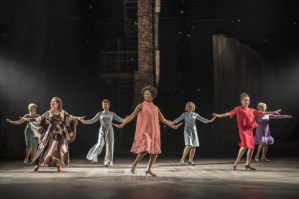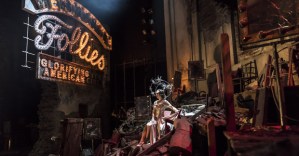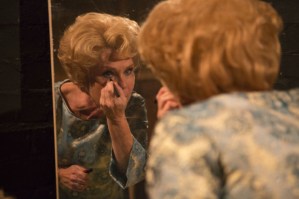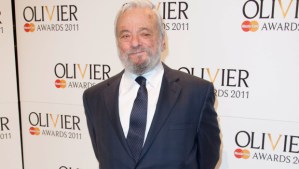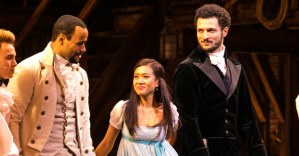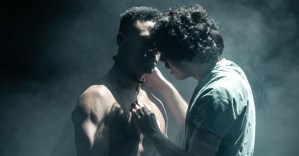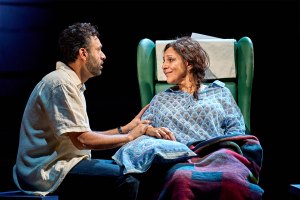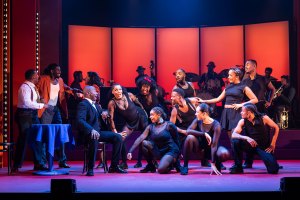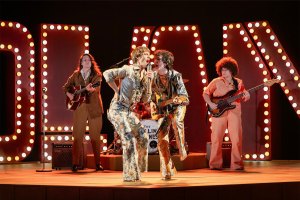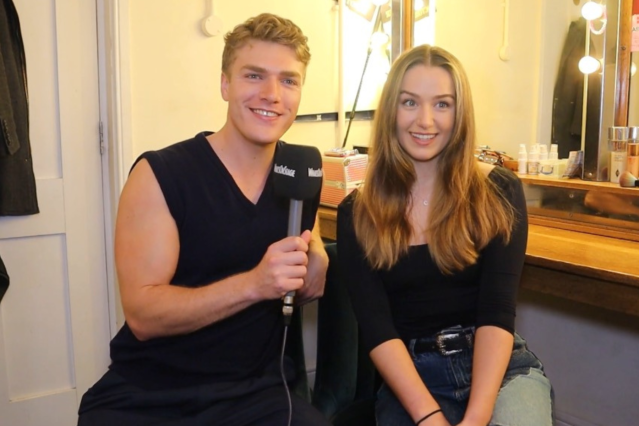Review: Follies (National Theatre)
Dominic Cooke’s production returns to London featuring several new cast members
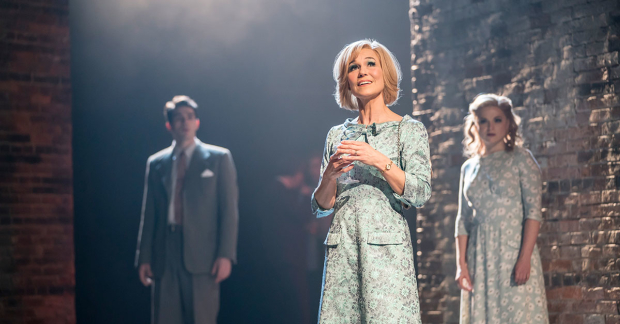
© Johan Persson
When Dominic Cooke's production of Stephen Sondheim's Follies first landed on the Olivier stage it scooped up virtually every award going. Now it's back, substantially recast, slightly reworked, and – amazingly – it glistens more brightly than ever.
Cooke's stroke of brilliance was to treat Sondheim's 1971 show, with its dramatic and melancholy book by James Goldman, as if it were less a musical and more a densely textured meditation on life's regrets and mistakes. It takes its reunion of the girls from the Follies, gathering together for one last time before their old theatre is knocked down to make way for a car park, and keeps the remembered glamour of the past, but sets it alongside survival in the present, with its shoddy compromises and searing disappointments.
As the production has developed and grown since its first appearance in 2017, and as new members of the cast have joined, its psychological insight and emotional truth has grown deeper. Every word of Sondheim's dazzling lyrics can be heard; each one is mined not only for its diamond-like shine, but also for the meaning it contains. Cooke's decision, mirrored by Bill Deamer's evocative choreography, to accompany each of the old troopers returning to the theatre with the young version of themselves, is wonderfully vindicated by the sharpness of the playing and the revelations that emerge.
On Vicki Mortimer's glimmering set, which covers the ruins of a battered old theatre with a glint of remembered magic, filling the dusty chairs and bare walls with the silver and gold of the elaborate Follies costumes, and the tugging loveliness of Paule Constable's shadowy lighting, past and present come together in soul-baring encounters that fracture and then, tentatively, heal broken lives.
Follies, traditionally, was always held to be a difficult Sondheim musical to stage, with its show-stopping tributes to musical numbers of the past sitting uncomfortably alongside its central story of two collapsing marriages – that of Ben and Phyllis, and of Buddy and Sally – which have their fault lines buried in the moment the four met, when the men courted the chorus girls. Yet the tightness of this production also shows how deftly Sondheim himself underlines the show's morals.
The operetta style "One More Kiss", for example, with its ‘never look back' is placed exactly at the moment when all the simmering discontent of the broken relationships is about to reach a head. On opening night, as sung by original cast member, Josephine Barstow (stepping in for an indisposed Felicity Lott) and her young counterpart Alison Langer, it had a shimmering loveliness that contrasts with the emotional nihilism of the song that follows it – Janie Dee's staggering, bitter denunciation of Ben in "Could I Leave You?" which is now played on a stage empty of everything except their unhappiness.
Returning to the part of Phyllis, Dee finds new levels of desolation and despair; every word is a barb, but also a plea, as her young self (Christine Tucker) looks on, appalled, at the woman she has become. Her Ben is now Alexander Hanson, whose effortless style and charisma make his final breakdown nakedly shocking. He also makes Ben's emotional sterility, utterly clear; his great, lyrical "Too Many Mornings" is sung with remarkable intensity, but he never looks at Sally as she is now, still holding a torch for him. All his passion is refracted onto her younger image (Gemma Sutton).
The young quartet have all been recast (Young Ben is Ian McIntosh and Young Buddy, Harry Hepple) and are all remarkable; their flickering emotions bring great complexity to the roles. Stepping into the shoes of Imelda Staunton, who was Sally in 2017, Joanna Riding makes the part her own.
Less brittle and less obviously unstable than Staunton, she approaches the reunion with the tremulous excitement of the girl she once was, all flirty glances and hopefulness. In "Buddy's Eyes" her ballad to her loyal but badly treated husband Buddy (Peter Forbes, moving and exceptional), has a ring of truth about it. This makes her final disillusion, when she realises Ben has never loved her and that she has been living a fantasy, all the more wrenching. Her treatment of "Losing My Mind", moving gradually from acceptance, through sardonic anger, to fearful bleakness, is heart-breaking.
Elsewhere, everything is equally impressive, both finely-observed and beautifully performed. The concluding "Follies", where soul-baring takes place in vaudeville turns – is brilliantly staged. Dawn Hope's leading of "Mirror Mirror", the routine when the old hoofers let rip, virtually stops the show; her observation at the end that ‘I love life' strikes like a bell. Claire Moore finds all kind of resonance in Broadway Baby and, as the survivor Carlotta, Tracie Bennett turns the showstopping "I'm Still Here" into a wry, sad monologue – a remarkable achievement.
I could go on. I had slight reservations about this production on its first opening; I have none now. It is a masterful realisation of a wise and truthful show. It feels both sad and life-enhancing. A triumph.




